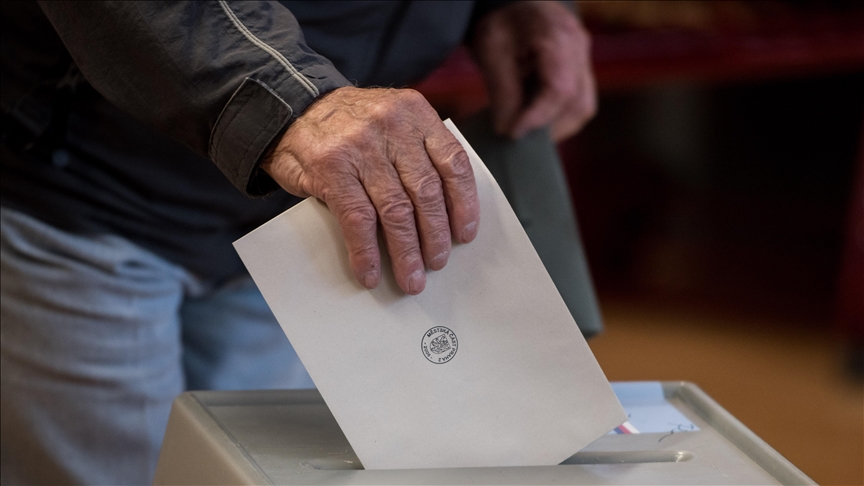EXPLAINER – Czech Republic elections: What to know about pivotal vote
Czechs will vote on Friday and Saturday in a parliamentary election widely seen as a referendum on the country’s place in Europe

- Czechs will vote on Friday and Saturday in a parliamentary election widely seen as a referendum on the country’s place in Europe
- ANO, the party of billionaire populist Andrej Babis, leads in polls but no group is likely to secure a majority, making coalition negotiations critical for the Czech Republic’s path
- ‘Government parties are framing the vote as a decision about the country’s direction: whether Czechia remains anchored in the West, or whether it shifts eastward and opens itself to Russian influence,’ says Czech political analyst Otto Eibl
ISTANBUL
Czechs head to the polls on Friday and Saturday in a parliamentary election widely seen as a referendum on the country’s place in Europe.
With former Prime Minister Andrej Babis’ populist, Eurosceptic ANO party leading in the polls, the vote could reshape Prague’s ties with the EU and NATO. Analysts warn that depending on coalition talks, the outcome could either reaffirm the Czech Republic’s Western orientation or open the door to greater influence from pro-Russian forces.
“The government parties are framing the vote as a decision about the country’s direction: whether Czechia remains anchored in the West, or whether it shifts eastward and opens itself to Russian influence,” Otto Eibl, a political science expert at Masaryk University, told Anadolu.
How does the system work?
The Czech Republic’s lower house, the 200-seat Chamber of Deputies, is elected every four years by proportional representation.
Parties must surpass thresholds to enter parliament: 5% for a single party, 8% for two-party alliances, and 11% for coalitions of three or more. The country is divided into 14 electoral districts, which allocate seats regionally.
Voters will cast ballots from 2 p.m. (1200 GMT) to 10 p.m. (2000 GMT) on Friday and 8 a.m. (0600 GMT) to 2 p.m. on Saturday, with results expected later that day.
Out of a population of over 10 million, turnout is expected to hover between 58% and 65%, in line with past elections since 2000. In 2021, turnout reached 65%.
For the first time, Czech citizens abroad will be able to vote by mail rather than traveling to embassies and consulates.
Who are the main contenders?
This year, over two dozen parties and movements are in the running, with seven polling above 5%.
ANO, led by billionaire Babis, has dominated the race, promising tax cuts and wage hikes, pushing for EU reform, and vowing to restrict immigration. The party is critical of Brussels’ Green Deal and Migration Pact.
The Spolu (Together) coalition, the ruling pro-Western, pro-Ukraine bloc led by Prime Minister Petr Fiala, includes the Civic Democrats, TOP 09, and Christian Democrats. Its campaign highlights NATO defense commitments and keeping the Czech Republic stable inside the EU.
Stacilo! (Enough), a left-wing movement rooted in the Communist Party, opposes NATO and EU membership while criticizing the Green Deal and support for Ukraine.
SPD, a far-right group, also campaigns against the EU and NATO, pushing for a referendum on leaving the EU and warning against “Islamization.”
Motorists, a right-wing Eurosceptic party, advocates defending sovereignty, reforming the EU while maintaining a pragmatic approach to the bloc, preserving the Czech currency, and supporting NATO.
The liberal Pirate Party – part of the ruling coalition until 2024 – and the centrist STAN – currently in the government – are both pro-European and remain influential players.
What issues matter most?
Eibl described the election as “unusual,” highlighting how “openly anti-system parties are gaining public support.”
Opposition groups emphasize domestic economic struggles, while the government warns of pro-Russian extremism.
“They frame the vote as a struggle over the very foundations of Czech liberal democracy, warning about threats to judicial independence, public media, and the country’s pro-Western orientation,” Eibl explained.
Migration remains a recurring but less urgent theme. “Parties like SPD use it as a mobilizing tool to scare voters and consolidate their support,” he added.
What are the expected outcomes?
No party is likely to secure a majority outright, making post-election coalition negotiations critical for determining the Czech Republic’s direction.
Surveys show ANO leading with more than 32% of support, Spolu at just over 21%, Pirate Party 11.2%, Enough 8.7%, and Motorists slightly shy of 5.5%.
“Babis is likely to win the election, but it is far from certain that he will become prime minister. His ownership of the Agrofert conglomerate creates an ongoing conflict of interest,” Eibl said.
The analyst was referring to the company Babis set up in the early 1990s, which has since grown into a global agri-food conglomerate with thousands of employees and extensive influence in the Czech Republic.
However, the company and Babis have also faced cases and controversies, including issues related to EU subsidies.
If coalition talks stall, Eibl suggested another ANO figure could become prime minister or even a technocratic Cabinet could be on the table.
Babis has ruled out working with hardline anti-EU and NATO parties and most government parties have rejected cooperation with him, which leaves open the possibility of “extremely complicated” negotiations, the analyst explained.
ANO’s potential partners could include the Enough coalition, the ultra-nationalist SPD, and Motorists.
“Despite all the uncertainty, I do not expect dramatic changes,” said Eibl, stressing that ANO officials have been clear that the Czech Republic “remains firmly anchored in NATO and the EU.”
Anadolu Agency website contains only a portion of the news stories offered to subscribers in the AA News Broadcasting System (HAS), and in summarized form. Please contact us for subscription options.







